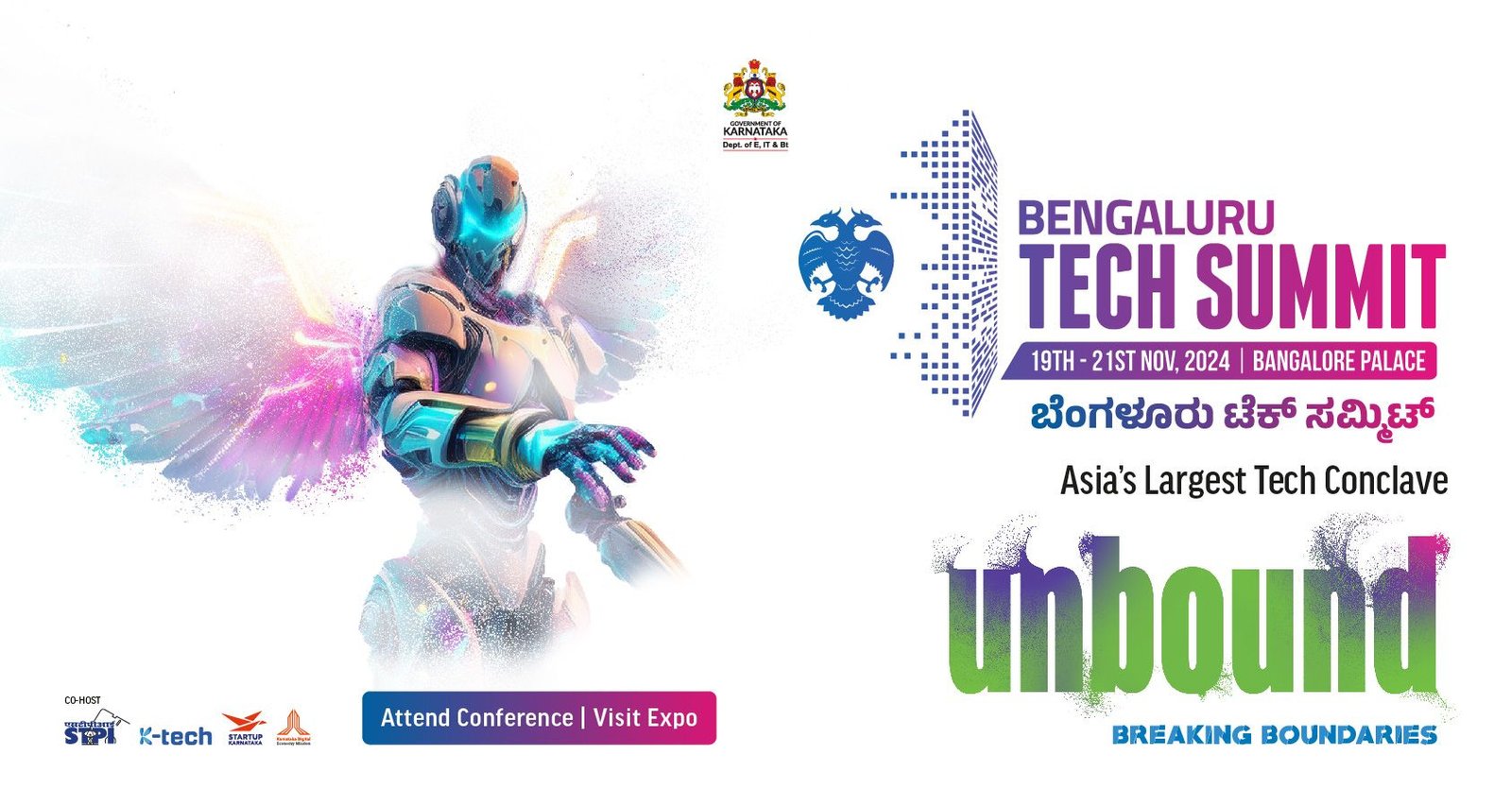[ad_1]
Bengaluru Tech Summit (BTS), Asia’s biggest technology event, brings together the global tech community, including industry leaders, policy makers, innovators, and technocrats.
The 27th edition of the summit, the flagship event of the Department of Electronics, IT, Bt, Government of Karnataka, and co-hosted by the Software Technology Parks of India (STPI), will be held on November 19-21, 2024, at Bangalore Palace.
The event will elevate the central theme of BTS, which is Breaking Boundaries, to Unbound. As barriers between nations, industry, sectors, and cultures continue to dissolve, this is the time for unbounded innovation, collaboration, and growth across the global IT, deeptech, ESDM, biotech, lifetech, and startup ecosystems.
BTS is driven by members of Karnataka’s Vision Groups on IT & electronics, biotechnology, and startups in close coordination with industry associations like Nasscom, IESA, ABAI, ABLE, TiE-Bangalore, US-India Business Council, Assocham, Indo-American Chamber of Commerce, FKCCI, and more. Startups in the IT, deeptech, electronics, semiconductor, AVGC, emerging tech, and biotech sectors will also be part of the event.
International Conference
BTS 2024’s conference sessions will be a powerhouse of knowledge-sharing, rich with insights from top-tier industry leaders, creating an invaluable space for networking, learning, and growth. Attendees will gain access to pioneering ideas that will fuel the future of technology, featuring perspectives from seasoned experts across multiple sectors. They can engage with leaders defining industry standards and making transformative strides in innovation.
More than 460 global speakers from industry, research, and academia will address 5,000+ delegates in 85+ sessions over six dedicated tracks. These include:
- IT, Deeptech & Trends Track
- Electro-Semicon Track
- Biotech & Healthtech Track
- Startup Ecosystem Track
- Global Collaborations Track
- India-USA Tech Conclave
The conference will feature global tech leaders and innovators, including Azim Premji, Founder Chairman, Wipro; Dr S Somanath, Chairman, ISRO; Kiran Mazumdar-Shaw, Executive Chairperson, Biocon; Chairperson, VGBt, GoK; Kris Gopalakrishnan, Co-Founder, Infosys, and Chairperson, VGITE, GoK; Prashanth Prakash, Founding Partner, Accel Partners; and Chairperson, VGST, GoK; Sindhu Gangadharan, MD, SAP Labs India; Chairperson, Nasscom; Nuseir Yassin, CEO and Content Creator, Nas Daily; David E. Duncan, Contributor, Vanity Fair and Wired, and CEO, Arc Fusion; Bhaskar Ghosh, Chief Strategic & Innovation Officer, Accenture; and Nithin Kamath, Co-founder, Zerodha.
A special feature this year will be a Dome Structured Hall, called the ‘Innovation Dome’, which will feature special programmes, workshops, product launches and so on.
Vibrant Exhibition
The BTS 2024 exhibition will provide a dynamic platform for companies and startups to showcase groundbreaking products, technologies, and solutions. It will be a hub of exploration and business networking, offering exhibitors opportunities to connect with potential partners, investors, and clients. Attendees can gain exposure, forge valuable partnerships, and demonstrate their company’s expertise on an international stage.
Focused Pavilions:
- Corporate & Industry
- Global Innovation Alliance
- Startup Zone
- STPI National Showcase
- MSME National Pavilion
- R&D Pavilion (Lab to Market)
- Leading States of India
- Karnataka Showcase
- Beyond Bengaluru
- Technology Parks
Sectoral Pavilions:
- Biotech & Healthtech
- Electronics & Semiconductors
- Telecom
- Spacetech
- Mobility
- Greentech
- Edtech
- BFSI & Fintech
- Animation & Gaming
Special Events & Programmes
BTS 2024’s special events will go beyond traditional sessions, recognising excellence, nurturing talent, and creating a vibrant environment for competition and celebration. These programmes will support the next generation of tech leaders and foster a collaborative spirit among professionals. From awards to quizzes, these events aim to inspire innovation and bring together diverse voices across industries.
Product Launch Arena: A Product Launch Stage is offered to startups, established companies, and innovators to unveil their latest product or service to the industry and media.
Beyond Bengaluru: This initiative of the Government of Karnataka is aimed at promoting emerging innovation clusters like Hubballi-Dharwad-Belagavi, Kalaburagi, Mysuru, Mangaluru and others.
Bio Poster Showcase: Bio Posters – the Walkway of Discovery is a platform for young researchers to showcase breakthrough ideas in healthtech and biotech sectors.
Awards: BTS recognises the contribution of achievers with awards like STPI IT Export Awards, Smart Bio Awards, Startup Awards & Exhibitor Awards.
Competitions: The TCS Rural IT Quiz and BioQuiz will engage and inspire young minds nationwide.
B2B Meetings: B2B meetings between startups, businesses, investors, and governments are a cornerstone of BTS 2024.
Why Bengaluru and Karnataka? Bengaluru, with its strong tech ecosystem, provides the ideal setting for BTS 2024. Supported by Karnataka’s progressive policies, Bengaluru and its innovation hubs—Hubballi, Mysuru, and Mangaluru—drive a robust tech industry. This summit will showcase Karnataka’s dedication to global technology leadership, economic growth, and innovation that benefits all.
BTS 2024 will be more than a gathering of top minds; it will be a platform where innovations are showcased, connections are made, and the future of technology is shaped. Join us in experiencing the power of collective innovation and ambition at BTS 2024, a summit where ideas meet action, and possibilities become reality.
[ad_2]
Source link





